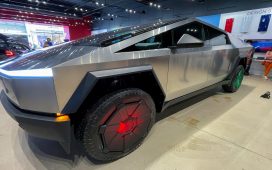Israeli companies Foretellix and Mobileye have teamed up to help automakers comply with the requirements of a new international automatic lane-keeping system regulation.
Startup Foretellix, based in Tel Aviv, and computer vision provider Mobileye, a subsidiary of Intel Corp. based in Jerusalem, announced an automatic lane-keeping systems verification package that addresses the requirements of a new United Nations regulation, the companies said Monday.
The regulation — adopted by the United Nations Economic Commission for Europe World Forum for Harmonization of Vehicle Regulations — creates regulation on Level 3 autonomy as it relates to automated lane-keeping systems.
Per SAE International guidance, Level 3 indicates the vehicle can operate with partial autonomy.
The regulation, drafted under the leadership of Germany and Japan, limits the operational speed of these systems to 60 km/hr (37 mph) and to passenger cars. It also includes general requirements regarding system safety and the system’s fail-safe response, how the driving task shall be handed over from the system to the driver, as well as emergency and minimum risk maneuvers and other requirements.
The regulation will apply in the EU following its entry into force on Jan. 1, 2021, and a number of auto manufacturers are expected to apply it upon its entry into force, UNECE has said.
Foretellix’s advanced driver-assistance system and highway solution, a verification package for Level 2 to Level 4 autonomy, now includes implementation of the new regulation.
The package “generated the required regulation scenarios and parameters and provided measurable metrics” on controlled vehicle behavior, according to a Foretellix statement.
It uses Mobileye’s Responsibility-Sensitive Safety model, which provides parameters for responsibility and caution, to ensure that “the tested vehicle does not initiate dangerous situations” and responds appropriately to dangerous situations.
Foretellix has touted its idea of eliminating the need to drive automated systems for millions of test miles on public roads. Instead, its software can generate tens of thousands of variants from a given driving scenario.
“Regulators will require proof of a vehicle’s ability to avoid reasonably foreseeable and preventable collisions,” Jack Weast, vice president of AV standards at Mobileye, said in the statement. The package “gives (automakers) a way to demonstrate compliance with the most advanced automated driving regulation in the world.”








